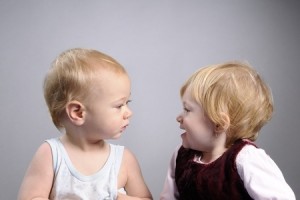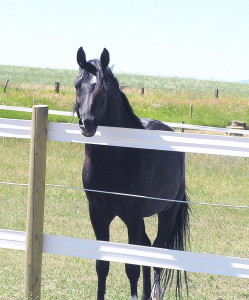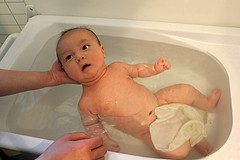More than words
 Talking is just one part of being able to communicate. Babies are able to communicate in lots of ways long before they are able to talk in words. By the time they are one year of age they can already get your attention, point things out, show you how they are feeling and even ask you for things by pointing and showing. They use all of these non-verbal ways to communicate well before they speak to you.
Talking is just one part of being able to communicate. Babies are able to communicate in lots of ways long before they are able to talk in words. By the time they are one year of age they can already get your attention, point things out, show you how they are feeling and even ask you for things by pointing and showing. They use all of these non-verbal ways to communicate well before they speak to you.
Learning to speak fluently takes your baby a few years, and this ability is affected by your baby’s development in other areas, like their physical development, how sociable they are, their hearing and vision.
Different babies develop at their own rates, and just because your friend’s baby might speak before yours, it doesn’t mean your friend’s baby is ‘cleverer’.
Health visitors and GPs can check up to make sure your baby is meeting all of their ‘developmental milestones’ if you’re worried. ‘Developmental milestones’ are certain markers that professionals look out for to show that a baby is developing at a normal rate—things like being able to sit or stand up on their own, or being able to say one or two words by a certain age.
Babies who regularly hear two different languages at home can take a little bit longer to start speaking, but this doesn’t do them any harm. In fact, the development of babies who grow up learning two languages is more advanced than that of babies who learn only one language.
Helping your baby to learn words
You don’t have to teach your baby how to talk in any formal way. They pick up words from you and others around that they hear in their everyday life. But there are some things that can help your baby to pick up words more easily.
Talk to your baby while you spend time with them, tell them what you’re doing, ask questions, make comments—it all helps them to soak up the new language! It can help to talk in short simple sentences sometimes. Name things as you use them too. So saying things like…
“Now we’ll get the brush and brush your hair”
“Hands up, let’s pop your vest on”
“Time for your bath, let’s get the water ready, it’s bath-time”
…can help your baby to learn the keywords you use.
You don’t have to talk to your baby constantly. If someone talked at you non-stop and never gave you
the chance to reply, you’d feel exhausted and unhappy—babies are just the same!
While you’re doing things together, take time to be quiet and watch what your baby does and seems interested in, and then talk about that. So you might see your baby reach for his teddy bear, and then you could say:
“Yes, teddy is coming in the buggy too, you like teddy”.
Pause after you’ve made a comment to see what your child does—he or she may chat back, smile or point at something new. This way, you’ll feel like you’re starting to have a conversation with your baby well before he or she can actually talk.
Try not to keep the TV or radio on loud all the time—it’s important that your baby can hear what you are saying.
You can also help your baby to learn language by reading story books to them. Talk about the pictures, name the characters in the story and say what they are doing while pointing out the pictures. The more babies are exposed to words, the easier they will pick them up, and having good language helps them to start learning when they go to school.
Stages of learning language
Before your baby uses words, they will use sounds and gestures to communicate with you. A very small baby uses crying to let people know that they need something. They can have different types of cry, depending how they are feeling.
![]()
Coming up to 2 to 4 months, they start to use little sounds to indicate pleasure, like ‘coo-ing’.
![]()
Between 4 and 9 months, babies start to babble, which means they make some letter sounds like ‘goo-goo, ga-ga’. They are starting to gain control of muscles around the mouth and tongue which allows them to do this. They will also shout or make loud noises to get your attention.
![]()
Around 9 to 12 months, they start to make certain sounds linked to a meaning, like saying ‘ba’ when they see their favourite ball. They also seem to change the pitch of their voice, like the pitch of a sound going up as if they’re asking a question.
Babies say their first words at around 10 to 18 months, with words like ‘mama’, ‘dada’ or everyday objects being common first words.
![]()
Between 18 and 24 months, babies start to link two words together in a phrase, like saying ‘ball gone’ or ‘daddy play’. This carries on for a year or so, and the toddler starts to make longer phrases like ‘Me want to go’ or “I bringed it”. It’s normal for them to make mistakes like this. It’s also common for them to pronounce some letter sounds incorrectly at this stage as they learn to use all of the sounds.
![]()
They keep learning how to make phrases and sentences, and by 4 to 6 years of age, children can usually speak in full sentences with mostly correct grammar.
Learning how to use language
 Part of learning language is less about ‘what’ you say, but ‘how’ you say it. For instance, learning to take turns in a conversation isn’t about learning what the words mean, it’s about making sense of the social side of talking to each other.
Part of learning language is less about ‘what’ you say, but ‘how’ you say it. For instance, learning to take turns in a conversation isn’t about learning what the words mean, it’s about making sense of the social side of talking to each other.
Very early on in development, from around 3 months of age, babies start to have little chats with their parents, where they look at you closely, listen to what you’re saying, and try to answer you with coos and gurgles. They are learning how to have a back and forth conversation before they have any words to put in to it!
Babies are also learning how to get your attention or ask you to do something, and they start this before they can speak by reaching for things and pointing things out to you.
As young children, they get better at using language, but they still have to learn how to have a proper back and forth conversation with their friends and their parents.
What do you mean?
 Babies learning language hear loads of new words, and they have to figure out what they’re about.
Babies learning language hear loads of new words, and they have to figure out what they’re about.
Researchers believe that babies often guess the meaning of words by the way they hear them used. So if they always hear the word ‘bath’ when they are being put in to the bath, and not at other times, they will soon figure out what ‘bath’ means.
But sometimes it’s a bit harder to figure out. If you were to point out ‘Look, there’s a lovely horse’, your baby has to work out what you’re pointing at, and they also need to figure out what a horse is (Are you pointing at the field or the thing with four legs? Is a horse everything with four legs or just this one?).
Small children sometimes make mistakes about this, like thinking that everything with four legs is a ‘doggie’. But overall they are surprisingly good at figuring out what new words mean.
By the time they are two years old they can say about 50 words but understand many more. This number grows to about 200 words by two and a half years, and by the time they are 6 years old they know around 14,000 words!

